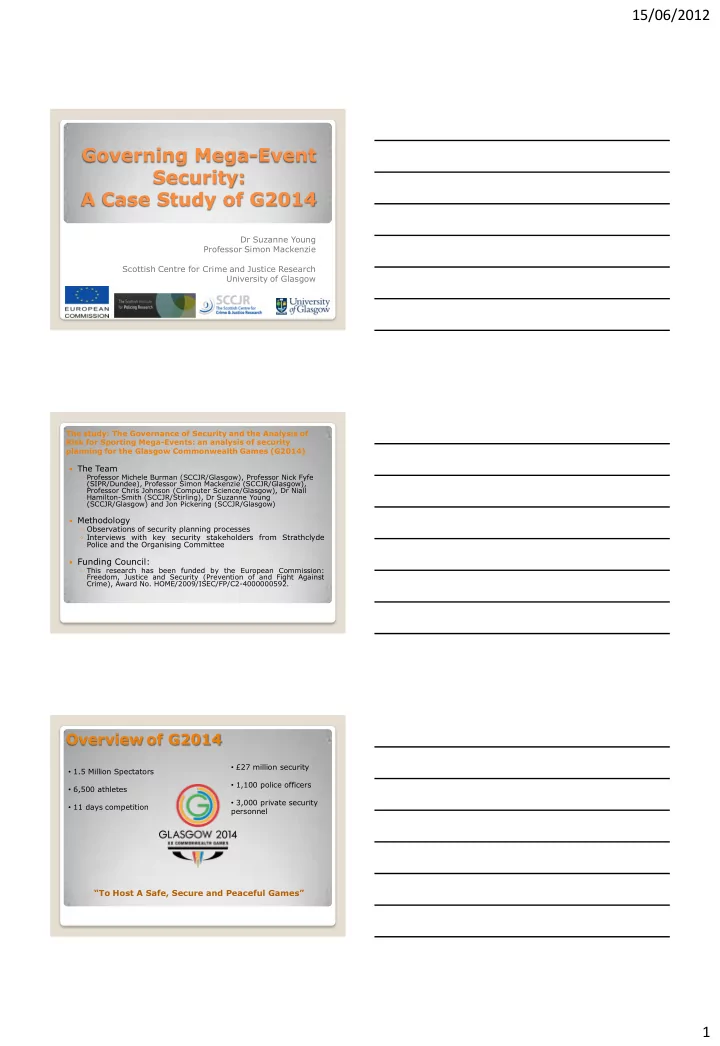

15/06/2012 Governing Mega-Event Security: A Case Study of G2014 Dr Suzanne Young Professor Simon Mackenzie Scottish Centre for Crime and Justice Research University of Glasgow The study: The Governance of Security and the Analysis of Risk for Sporting Mega-Events: an analysis of security planning for the Glasgow Commonwealth Games (G2014) The Team ◦ Professor Michele Burman (SCCJR/Glasgow), Professor Nick Fyfe (SIPR/Dundee), Professor Simon Mackenzie (SCCJR/Glasgow), Professor Chris Johnson (Computer Science/Glasgow), Dr Niall Hamilton-Smith (SCCJR/Stirling), Dr Suzanne Young (SCCJR/Glasgow) and Jon Pickering (SCCJR/Glasgow) Methodology ◦ Observations of security planning processes ◦ Interviews with key security stakeholders from Strathclyde Police and the Organising Committee Funding Council: ◦ This research has been funded by the European Commission: Freedom, Justice and Security (Prevention of and Fight Against Crime), Award No. HOME/2009/ISEC/FP/C2-4000000592. Overview of G2014 • £27 million security • 1.5 Million Spectators • 1,100 police officers • 6,500 athletes • 3,000 private security • 11 days competition personnel “To Host A Safe, Secure and Peaceful Games” 1
15/06/2012 Mega-events as a study of security Internationalisation of security Cultural Culture Advancements ideologies of of High in crime risk Security control Political and bureaucratic contexts of security Political context of G2014 Scottish Scottish Referendum Police 2014 Reform 2013 UEFA Euro Scottish Fire 2020 Bid and Rescue (with Wales Reform 2013 and Ireland) Glasgow Bid for 2018 Youth Olympics Bureaucratic context of G2014 Governance of security ◦ Multi-level governance ◦ Nodal governance Ownership of risk and responsibilisation ◦ Blurring the boundaries of accountability [T]he blurring of responsibilities creates an ambiguity and uncertainty in the minds of policy-makers and public about who is responsible and can lead to government actors passing off responsibility to privatised providers when things go wrong. Worse still is the scapegoating raised by more complex governance systems. (Stoker, 1998: 22) 2
15/06/2012 Bureaucratic context of G2014 Governance of security ◦ Multi-levelled nodal governance Ownership of risk and responsibilisation ◦ Blurring the boundaries of accountability [T]he blurring of responsibilities creates an ambiguity and uncertainty in the minds of policy- makers and public about who is responsible and can lead to government actors passing off responsibility to privatised providers when things go wrong. Worse still is the scapegoating raised by more complex governance systems. (Stoker, 1998: 22) Our thoughts so far... Risk conflict: ◦ Reputation versus securitisation versus sporting spectacle G2014 is enabling security to be introduced into communities (i.e. athletes village) to enhance the city profile. Mega-events highlight how security is an international 'business' for both the Government and private stakeholders. 3
15/06/2012 Discussion questions Is mega-event security unique in comparison to everyday policing? How can mega-events enhance our understanding about the internationalisation or standardisation of crime control? Can the multi-level partnership working tell us something about the future of securitisation? 4
Recommend
More recommend